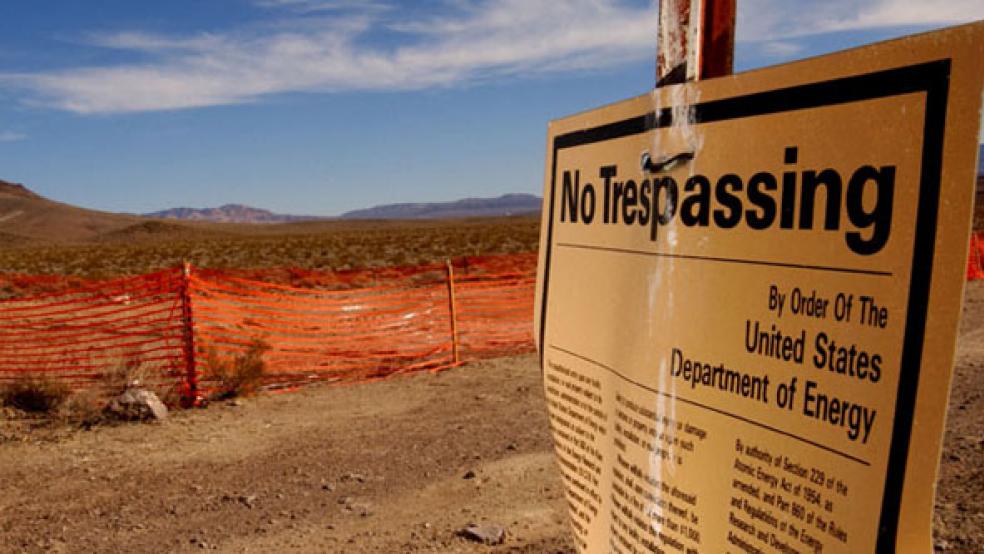President Obama's hopes for a comprehensive energy policy may be dying in Congress, but at least one sector of his agenda is moving forward, albeit slowly: nuclear power. Earlier this year, Obama announced an $8.3 billion loan that could lead to construction of the first U.S. nuclear plant in three decades, in Burke, Ga. Federal guarantees for up to $25 billion more in loans for new plants are working their way through Congress.
But deficit hawks, alongside environmentalists and nonproliferation groups, are protesting this expansion of nuclear power. The government has already subsidized the nuclear industry to the tune of more than $100 billion, they say, and the risk of default on the loans is more than 50 percent.
At the same time that the administration is pushing more nuclear power, it is also delaying the ability to deal with nuclear waste by moving to shutter the national nuclear waste repository at Yucca Mountain in Nevada. Further, the decision to shutter Yucca Mountain has contributed to penalties and lawsuits from state utilities that run into the billions of dollars. Those utilities were supposed to start sending waste to Yucca Mountain in 1998. With Yucca effectively blocked, there is nothing on the drawing boards to take its place as a national waste repository. Rep. Dennis Kucinich, D-Ohio, who has studied the issue since 1977, said the nuclear loan guarantees are an example of the government propping up a corporate industry. "Wall Street will go for anything that it looks like it can sell – the sky and the sun and the moon, but it won't touch nuclear power," he said. "Think about it: if Wall Street won't back them up, why does the government?"
Obama's support for nuclear power was both an endorsement of a source of carbon-emissions-free energy and a gesture to the energy industry, whose support he is seeking for a broader energy plan. "To meet our growing energy needs and prevent the worst consequences of climate change, we'll need to increase our supply of nuclear power," Obama said earlier this year. "It's that simple."
Obama also campaigned on closing the controversial Yucca Mountain project, and the Democratic Congress has accordingly cut back and now has proposed to zero out its funding. Yucca also faces the strong opposition of Sen. Harry Reid of Nevada, the Senate's top Democrat. "As long as he is Senate Majority Leader, Yucca Mountain will never be built,” Reid spokesman Tom Brede told Roll Call.
Many environmentalists and Democrats support that stance, but some of them say it's irresponsible to push more nuclear power into production while leaving states with no plan to deal with the waste – 62,000 metric tons at 120 sites in more than 30 states. "I believe we should not be discussing the future of nuclear power until we start cleaning up our current toxic waste mess," said Rep. Betty McCollum, D-Minn., whose district sits near the Prairie Island nuclear plant, and who said that it's "irresponsible to abandon the study of Yucca until you come up with a better option."
Democratic Sen. Patty Murray, who notes that her home state of Washington contains two-thirds of the country's high-level nuclear waste, recently tried to add $200 million back to Yucca's budget. But Murray's effort, in the Senate Appropriations Committee, was rejected, with nearly all Democrats voting against her.
"Over the last 30 years, Congress, independent studies, and previous administrations have all pointed to and voted for and funded Yucca Mountain as the nation's best option for nuclear repository," Murray said earlier this year. "Without a repository, these sites and communities that support them have now really been left in limbo."
As for the waste, the feds were supposed to start collecting that in 1998. Instead, it has stayed put in states throughout the country, which has led to more than 70 breach-of-contract lawsuits against the government, 33 of them still pending. The government has been instructed to pay $2 billion so far, though some of those judgments may be appealed. Its total liabilities are estimated at $13.1 billion, and the cases have cost $200 million to litigate.
Yucca Mountain was chosen because the federal government decided it should take responsibility for the country's nuclear waste, and in 1982 began a search for a permanent nuclear waste storage program. Since 1983, the federal government has collected more than $17 billion in fees from the nuclear industry to fund the program; that fund now holds about $25 billion.
In Yucca's place, the administration set up a commission to study the issue and report back next year on a new way forward. But the commission is expressly forbidden from considering Yucca, which has already exposed it to ridicule from Republicans who question the administration's commitment to following sound science. "The only place we know more about than any place on Earth – we're not going to consider it," said Rep. Mike Simpson, R-Idaho. As for what a new facility might cost: The Congressional Budget Office in 2008 estimated the total cost for Yucca over 100 years at $96 billion. Nuclear supporters, including some who want to keep Yucca open, say the commission approach is the next best thing, even though it may be decades before its recommendations can be implemented.
The administration is also trying to withdraw its Yucca Mountain application to the Nuclear Regulatory Commission. In June an NRC panel ruled that the administration does not have the authority to do so, but the case continues. That means that Yucca can't be deemed completely dead, especially if control of Congress shifts to the Republicans this November. "Recognizing the fact that the president is bound and determined to shut down Yucca Mountain, it's not over, as far as I'm concerned," said Rep. Rodney Frelinghuysen, R-N.J.
The administration argues that nuclear waste processing and geological modeling have advanced since its original work began in 1982. "This administration believes that it is time to step back and look at what we've learned and see if there's a better solution with broader support," Undersecretary of Energy Kristina Johnson told the House Budget Committee on July 27.
"I'm not sure there's any getting it right," Simpson said. "We have to do the best we can with the technology we have at the present."
Though the Georgia plant will take years to get off the ground, nuclear boosters say it's important to give some assurance to the lenders to support the project in a fragile economy. "In the wake of a financial meltdown I think we need as much stability as possible," Frelinghuysen said. "The building of these new nuclear power plants are going to sustain our country for a long time."
Energy Secretary Steven Chu rejected the idea that nuclear energy is not viable in the long term without government help. "Under no circumstances, I believe, should you nurture a technology where … it would need subsidy forever," he told a Senate subcommittee in March. "But virtually every technology as it begins and emerges – and it's also true of nuclear, wind, solar – these things needed a little nurturing."
Regardless of the ultimate solution, the administration will have to deal with congressional parochialism to get any waste plan approved. "Most states are going to have the same reaction that Nevada had with Yucca Mountain: Not in my backyard," said Sen. Johnny Isakson, R-Ga.





